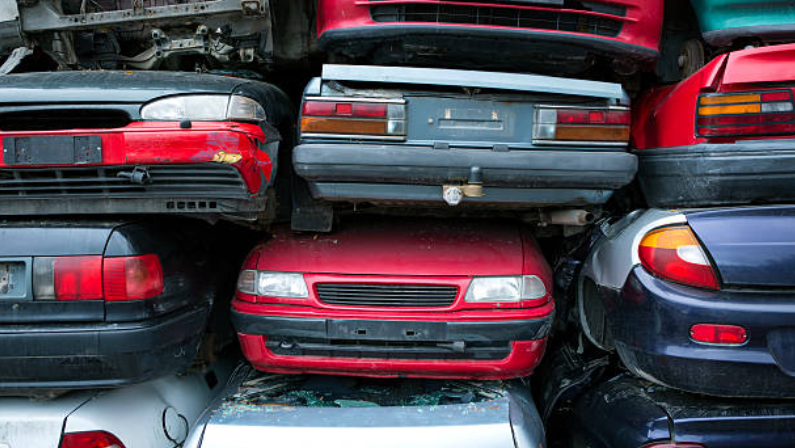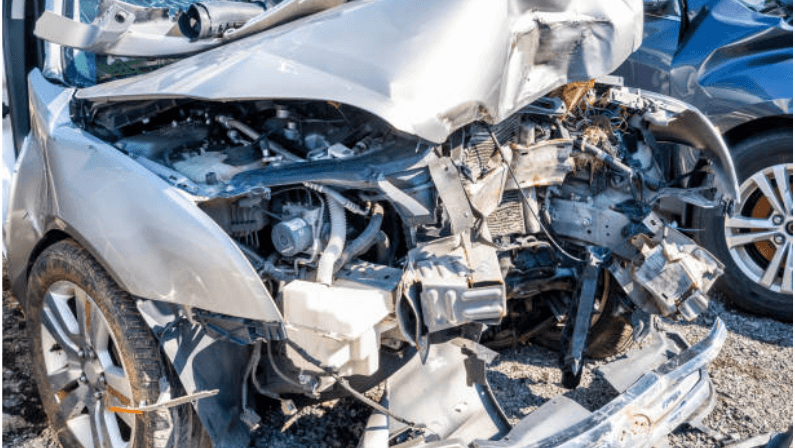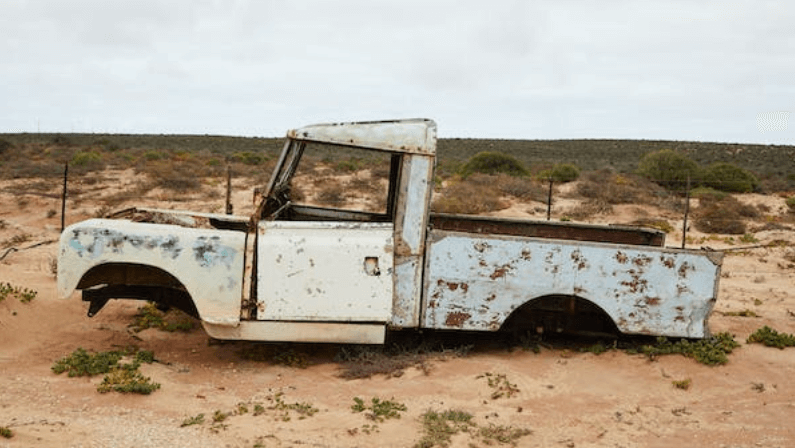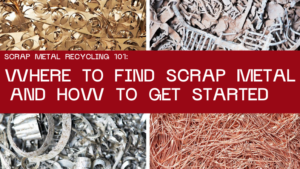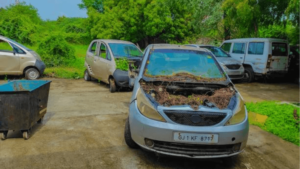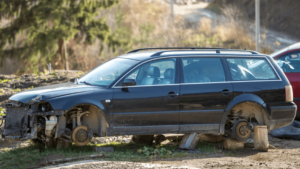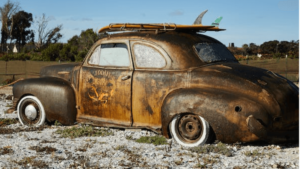You might have an old vehicle in your garage, and you’re probably thinking about scrapping it. The truth is a car doesn’t have to be in an extreme state of decay to be considered junk or ready for the scrapyard.
If your car can’t reliably take you where you need to go and ends up in the mechanic’s garage, it might be ready for the scrapyard. Should you scrap your car if it’s totaled? Check out this blog for things to consider before saying goodbye to your trusted car.
A scrap car is typically viewed as a vehicle that’s too old or damaged to be roadworthy and is destined for recycling at scrap or junkyards. While you might imagine a completely totaled car reduced to a ball of crushed metal, not all scrap cars result from severe accidents.
Even if your car looks decent, it can still be considered scrap if it has a busted engine, blown-out tires, or is deemed unsafe to repair, rendering it inoperable.
How To Know When You Should Scrap Your Car
Wondering when to scrap your car? It’s a common dilemma, with questions about whether to junk it or consider selling it. While it may seem like no one would buy a car in its current state, you must evaluate if your car is genuinely scrapped.
A key indicator is when an experienced mechanic deems it too rundown or old to be feasibly fixed. Cars have a lifespan, and if professionals agree that your vehicle is beyond repair, it’s a strong signal that it might be time to consider scrapping it.
Seeking opinions from different auto repair shops can provide valuable insights, but if a seasoned mechanic suggests it’s no longer fixable, it’s worth considering their advice.
Signs You Should Scrap Your Car
Deciding when to part ways with your car can be puzzling, influenced by various factors. Here are some common reasons:
1. Repairs Cost More Than the Car
If fixing your car costs more than its value, consider scrapping it. Whether it’s old, failed its MOT, or damaged, we offer competitive quotes.
2. Car Declared a Write-Off
If your car is written off, it might be beyond repair or too costly to fix. Explore scrap options for better value.
3. Quick Disposal Without Selling
If selling is a hassle, scrapping is a convenient option. Click a few buttons, and your car could be gone the next day.
4. Not Worth Enough to Sell
Older, rundown, or extensively damaged cars may not fetch enough in a private sale. Scrapping is a time- and cost-effective alternative.
5. Missing Parts
Stripped-off valuable parts leave a non-functional car ideal for scrapping. Even if a few parts are missing, scrapping may be more practical.
6. No Longer Needed
If you’ve upgraded, moved, or no longer require the car, scrapping offers a quick and effective way to dispose of it.
7. Fuel Inefficiency
Fuel-inefficient cars can be costly to maintain. If selling is challenging, scrapping becomes a viable solution.
12 Things to Consider Before Scrapping Your Car
Deciding whether to scrap your car is a crucial crossroads. While a crystal ball isn’t an option, the following factors can guide your decision:
1. Balancing Maintenance Costs and Monthly Payments
When scraping your car, calculate annual maintenance, including routine tasks and potential repairs. Obtain estimates for potential fixes to accurately gauge costs.
Divide the yearly upkeep by twelve for a precise monthly expense. Use this figure to assess financial viability within your budget, facilitating an informed decision on whether to stick with your current vehicle or explore scrapping.
2. Insurance Costs
When contemplating scrapping your car, it’s essential to factor in the potential insurance costs for a new vehicle. There’s a likelihood that the insurance premium for a new car could be higher.
Notably, many paid-off used cars often don’t necessitate collision insurance. Therefore, understanding the insurance implications is a key aspect to consider in your decision-making process.
3. Available Incentives for New Vehicles
Dealers often offer rebates for individuals willing to trade in their existing vehicles. This can be a valuable opportunity to offset costs and enhance the overall value of upgrading to a new car.
Investigating these incentives can be crucial in making an informed decision about transitioning to a different vehicle.
4. Exploring Incentives and Replacement Options
Transitioning from one problematic car to another can be avoided by carefully assessing potential replacements.
Be mindful of the condition and reliability of the replacement vehicle to ensure a smooth transition without encountering new issues that may require immediate repairs.
Take the time to thoroughly evaluate your replacement options to make an informed decision about the next vehicle in your journey.
5. Determining Your Car’s Present Value
By entering the year, make, mileage, and wear condition, you can obtain a relatively accurate estimate. However, you must consider that the value may drop significantly if your car requires any repair work.
Therefore, for a more realistic valuation, it’s important to account for the overall condition, including any needed repairs, ensuring a comprehensive understanding of your car’s current market value.
6. Evaluating Your Car’s History
Have you diligently maintained it? Has it been involved in any accidents? Is there any history of flood damage? These factors significantly impact your car’s potential trade-in value, potentially leaning toward the decision to scrap your car.
Regular maintenance, accident-free history, and absence of flood damage contribute to a higher trade-in value, providing essential insights as you weigh your options.
7. Previous Repairs
At some point, everyone reaches a tipping point with repairs, signaling “Enough is enough.” Yet, you must reflect on the time and money invested in maintaining your vehicle. If you’ve undergone major replacements, you’ve made a significant commitment to keeping your vehicle operational.
8. Major Repairs to Consider
Among the most expensive fixes for your vehicle are the engine and transmission. If you’ve invested in replacing either, holding onto your car is a sensible choice. On the flip side, if you haven’t addressed these major components, they become ticking time bombs.
9. Assessing the Repair Timeline
When researching potential issues with your car on online forums, it’s crucial to observe the frequency of reported repairs. If it appears that problems keep arising in succession, it’s likely a sign that it’s time to minimize your losses and consider alternative options.
10. Assessing the Body Condition of Your Car
While surface rust on the car’s body might not impact its drivability, it serves as a red flag for potential hidden rust in critical areas.
Rust has a knack for hiding in less conspicuous places, such as the fuel and brake lines. As you’re reading this, these vital components may be gradually eroding.
11. Ensuring Vehicle Safety
Apart from the external condition of your car, it’s crucial to assess its safety features. Check if your airbags are functional, ensure the proper functioning of seatbelts, inspect tire tread depth, and assess the condition of your brake pads.
12. Assessing Your Needs
Beyond the car’s physical condition, you must evaluate if it aligns with your lifestyle requirements. Consider factors such as:
- size
- fuel efficiency
- functionality
For instance, if the car is too large and guzzles gas or too small without a backseat for your kids, it might not meet your needs.
5 Steps to Take Before You Get Your Car Scrapped
Before you scrap your old car, here’s what you should know before selling your car for scrap:
1. Remove All Personal Items
Before scrapping, thoroughly check every compartment for personal items. From under the seats to the glove box, leave no place unchecked to ensure nothing of personal value is scrapped.
2. Cancel Your Insurance Policy
Save on expenses by cancelling your car insurance. If you’ve pre-paid, check if you can get a refund upon returning your plates and cancelling your plan. Consult your insurance agent for the best course of action.
3. Remove the License Plates
Take off the license plates, which can’t be transferred to another person. Either use them on another vehicle under your name or return them to your Autoplan broker. Plates must be returned once you cancel your insurance, but if your plan has expired, plate return may not be necessary.
4. Get Your Documentation Ready
Have your vehicle documentation ready, such as a valid title or car registration, to prove ownership. If these are misplaced, a valid BC driver’s license is an alternative, as it’s required for scrap car removal.
5. Have Realistic Price Expectations
Understand the realistic value of your scrap car. While everyone wants the best price, remember that a scrap car won’t fetch its original value.
Provide details on the make, model, and condition for an accurate assessment before the collection.
Reasons Why Scrapping is Better Than Selling Your Car
Here’s why opting for scrapping over selling your car is a smart choice:
1. Quick and Easy Transaction
Scraping provides a swift and hassle-free process. Unlike dealing with private buyers, scrap car buyers readily accept old vehicles, making negotiations straightforward. Many companies now offer online services, ensuring a faster and safer deal.
2. Safer Market with Scrapping
Selling your car privately involves rigorous safety precautions and background checks. While researching junkyards is encouraged, most registered car scrap removal companies provide a safer and easier transaction process, with accountability for any discrepancies.
3. Sell Junk Vehicles Without Trouble
Determining the value of your car in its current state is simpler than scrapping. Trying to sell a worn-out car privately has challenges such as lowballing, decreasing resale value, and more.
4. Good for the Environment
Scrap yards adhere to specific environmental regulations, ensuring ethical and environmentally friendly procedures in car disposal.
By selling your used vehicle to a scrap yard, you earn extra cash and contribute to environmental well-being through responsible waste management and recycling practices.
Get Your Car Scrapped Hassle-Free with Langille’s Metal Recycling
While selling may seem like an option, scrapping offers advantages like a quick and easy transaction, a safer market, and the ability to sell even junk vehicles without trouble.
For an efficient scrap car removal experience, consider Langille’s Metal Recycling, ensuring a seamless process as you bid farewell to your trusted four-wheeler. Contact us now.
Frequently Asked Questions About Scrapping Your Car
1. What is the timeframe for scrapping my vehicle?
You have 30 days from the approval date to complete the scrapping process.
2. Do I need to take off my license plates myself?
Yes, it is your responsibility to remove your license plates. Ensure you bring the necessary tools to take them off when delivering your car to the scrap location. This is essential for transferring your insurance to a replacement vehicle.
3. Can I dismantle parts from my vehicle before scrapping?
No, cars must be delivered to the scrap yard in their entirety. It is not permitted to remove tires, seats, steering wheels, batteries, or any other parts before or during the delivery process. Upon arrival at the scrap yard, you must also remove your license plates.



